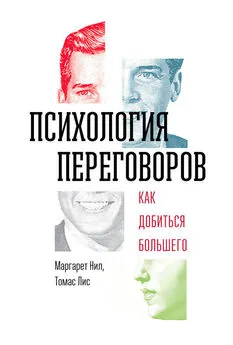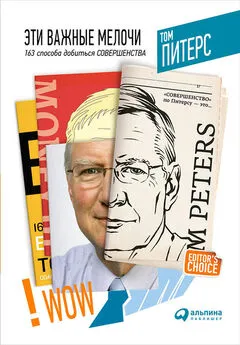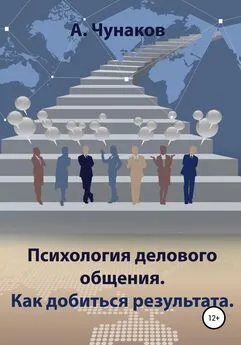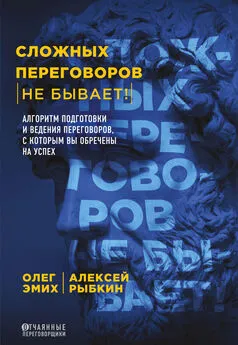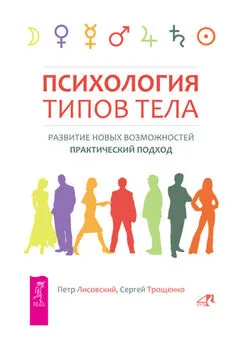Томас Лис - Психология переговоров. Как добиться большего
- Название:Психология переговоров. Как добиться большего
- Автор:
- Жанр:
- Издательство:Манн, Иванов и Фербер
- Год:2016
- Город:Москва
- ISBN:978-5-00100-067-9
- Рейтинг:
- Избранное:Добавить в избранное
-
Отзывы:
-
Ваша оценка:
Томас Лис - Психология переговоров. Как добиться большего краткое содержание
Эта книга написана не только для тех, кому нравится договариваться, но и для тех, кто переговоров избегает, а также для тех, кому сложно понять, угадал он или прогадал, вступив в переговоры. В ней нашли отражение результаты эмпирических исследований, которые авторы проводили на протяжении нескольких десятилетий, тщательно анализируя различные стратегии и проверяя их эффективность в различных условиях применения.
Книга будет полезна всем, кому приходится вступать в переговоры и вести их – как на работе, так и в повседневной жизни и в семье.
На русском языке публикуется впервые.
Психология переговоров. Как добиться большего - читать онлайн бесплатно ознакомительный отрывок
Интервал:
Закладка:
8
Steele C. M., Aronson J. Stereotype threat and the intellectual test performance of African Americans // Journal of Personality and Social Psychology. – 1995. – № 69(5). – P. 797–811.
9
Shih M., Pittinsky T. L., Ambady N. Stereotype susceptibility: Identity salience and shifts in quantitative performance // Psychological Science. – 1999. – № 10. – P. 81–84.
10
Belliveau M.A. Engendering inequity? How social accounts create versus merely explain unfavorable pay outcomes for women // Organizational Science. – 2012. – № 23. – P. 1154–1174.
11
Reilly H. B., Babcock L., McGinn K. L. Constraints and triggers: Situational mechanisms of gender in negotiation // Journal of Personality and Social Psychology. – 2005.
12
Kray L. L., Thompson L., Galinsky A. Battle of the sexes: Stereotype confirmation and reactance in negotiations // Journal of Personality and Social Psychology. – 2001. – № 80(6). – P. 942–958; Kray L., Galinksy A., Thompson L. Reversing the gender gap in negotiation // Organizational Behavior and Human Decision Process. – 2002. – № 87. – P. 386–410.
13
Tuncel E., Mislin A., Desebir S., Pinkley R. The Agreement Bias: Why Negotiators Prefer Bad Deals to No Deal at All // Working paper, St. Louis, MO: Webster University, 2013.
14
R. L. Pinkley, M. A. Neale, and R. J. Bennett, “The Impact of Alternatives to Settlement in Dyadic Negotiation,” Organizational Behavior and Human Decision Processes 57, no. 1 (1994): 97–116.
15
Morris M. W., Larrick R. P., Su S. K. Misperceiving negotiation counterparts: When situationally determined bargaining behaviors are attributed to personality traits // Journal of Personality and Social Psychology, – 1999. – № 77(1). – P. 52.
16
Можно поспорить о неоднозначности цены бронирования. Например, что, если заявленная цена составляет 28 +/– 2 доллара? На деле же это означает, что цена бронирования будет менее 30 долларов и ни центом больше! Подробнее бронируемые цены мы рассмотрим в главе 3.
17
Huber V. L., Neale M. A. Effects of self and competitor goals on performance in an interdependent bargaining task // Journal of Applied Psychology. – 1987. – № 72(2). – P. 197; Huber V. L., Neale M. A. Effects of cognitive heuristics and goals on negotiator performance and subsequent goal setting // Organizational Behavior and Human Decision Processes. – 1986. – № 38(3). – P. 342–365.
18
Pinkley R. L., Neale M. A., Bennett R. J. The impact of alternatives to settlement in dyadic negotiation // Organizational Behavior and Human Decision Processes. – 1994. – № 57(1). – P. 97–116.
19
Wiltermuth S. S., Neale M. A. Too much information: The perils of nondiagnostic information in negotiations // Journal of Applied Psychology. – 2011. – № 96(1). – P. 192.
20
Galinsky A., Mussweiler T., Medvec, V. Disconnecting outcomes and evaluations in negotiation. The role of negotiator focus // Journal of Personality and Social Psychology. – 2002. – № 83. – P. 1131–1140.
21
Pruitt D. G. Negotiation behavior (Vol. 47). – New York: Academic Press, 1981.
22
Tuncel E., Mislin A., Desebir S., Pinkley R. The Agreement Bias: Why Negotiators Prefer Bad Deals to No Deal at All // Working paper. – St. Louis, MO: Webster University, 2013.
23
Wiltermuth S., Tiedens L. Z., Neale M. A. Dominance complementarily in negotiations. Symposium presentation. – Academy of Management annual meeting, San Antonio, TX, 2011.
24
Messick D. M., McClintock C. G. Motivational bases of choice in experimental games // Journal of experimental social psychology. – 1968. – № 4(1). – P. 1–25.
25
Подробнее об этой стратегии создания ценности см. Bazerman M. H., Gillespie J. J. Betting on the future: The virtues of contingent contracts // Harvard Business Review. – 1999. – September – October.
26
Polzer Jeffrey T., Neale Margaret A. Constraints or catalysts? Reexamining goal setting within the context of negotiation // Human Performance. – 1995. – № 8. – P. 3–26.
27
Marks G., Miller N. Ten years of research on the false-consensus effect: An empirical and theoretical review // Psychological Bulletin. – 1987. – № 102(1). – P. 72.
28
Cao J., Phillips K. W. Team diversity and information acquisition: How homogeneous teams set themselves up to have less conflict // Working paper, Columbia Business School. – 2013.
29
Stuhlmacher A. F., Walters A. E. Gender differences in negotiation outcome: A meta-analysis // Personnel Psychology. – 1999. – 52(3). – P. 653–677; Bowles H. R., Babcock L., McGinn K. L. Constraints and triggers: situational mechanics of gender in negotiation // Journal of personality and social psychology. – 2005. – 89(6). – P. 951.
30
Morris M. W., Larrick R. P., Su S. K. Misperceiving negotiation counterparts: When situationally determined bargaining behaviors are attributed to personality traits // Journal of Personality and Social Psychology. – 1999. – № 77(1). – P. 52.
31
Wilson T., Lisle D., Wetzel C. Preferences as expectations-driven inferences: Effects of affective expectations on affective experiences // Journal of Personality and Social Psychology. – 1989. – № 56. – P. 519–530.
32
Lee L., Frederick S., Ariely D. Try it, You’ll like it // Psychological Science. – 2006. – № 17. – P. 1054–1058.
33
Tinsley C. H., O’Connor K. M., Sullivan B. A. Tough guys finish last: The perils of a distributive reputation // Organizational Behavior and Human Decision Processes. – 2002. – № 88(2). – P. 621–642; Neale M. A., Fragale A. R. Social cognition, attribution, and perception in negotiation: The role of uncertainty in shaping negotiation processes and outcomes // Negotiation theory and research. – 2006. – P. 27–54.
34
Staw B. M., Sandelands L. E., Dutton J. E. Threat rigidity effects in organizational behavior: A multilevel analysis // Administrative science quarterly. – 1981. – P. 501–524; Ocasio W. The enactment of economic adversity – a reconciliation of theories of failure-induced change and threat-rigidity // Research in Organizational Behavior: An Annual Series of Analytical Essays and Critical Reviews. – 1995. – Vol. 17. – P. 287–331.
35
Kruglanski A. W. The psychology of being “right”: The problem of accuracy in social perception and cognition // Psychological Bulletin. – 1989. – № 106. – P. 395–409.
36
Kruglanski A. W., Webster D. M. Motivated closing of the mind: “Seizing and freezing” // Psychological Review. – 1996. – № 103. – P. 263–283; Mayseless O., Kruglanski A. W. What makes you so sure? Effects of epistemic motivations on judgmental confidence // Organizational Behavior and Human Decision Processes. – 1987. – № 39. – P. 162–183; Webster D., Kruglanski A. W. Individual differences in need for cognitive closure // Journal of Personality and Social Psychology. – 1994. – № 67. – P. 1049–1062.
37
De Dreu C. K. W. Time pressure and closing of the mind in negotiation // Organizational Behavior and Human Decision Processes. – 2003. – № 91. – P. 280–295.
38
Dual-process theories in social psychology / Chaiken S., Trope Y. (Eds.). – New York: Guilford Press, 1999.
39
Lerner J. S., Tetlock P. E. Accounting for the effects of accountability // Psychological Bulletin. – 1999. – № 125. – P. 255–275; Tetlock P. E. The impact of accountability on judgment and choice: Toward a social contingency model // Advances in experimental social psychology / L. Berkowitz (Ed.). – New York: Academic Press, 1992. – Vol. 25. – P. 331–376.
40
Petty R. E., Cacioppo J. T. The elaboration likelihood model of persuasion // Advances in experimental social psychology / L. Berkowitz (Ed.). – New York: Academic Press, 1986. – Vol. 19. – P. 123–205.
41
De Dreu C. K. W., Koole S., Steinel W. Unfixing the fixed-pie: A motivated information processing of integrative negotiation // Journal of Personality and Social Psychology. – 2000. – № 79. – P. 975–987.
42
Но даже в такой экстремальной ситуации, как показывают исследования, диктаторы хотя бы отчасти принимают в расчет интересы своих «подчиненных». Подробнее см., например: Cason T. N., Mui V. L. Social influence in the sequential dictator game // Journal of Mathematical Psychology. – 1998. – № 42(2). – P. 248–265; Bolton G. E., Katok E., Zwick R. Dictator game giving: Rules of fairness versus acts of kindness // International Journal of Game Theory. – 1998. – № 27(2). – P. 269–299.
43
Güth W., Tietz R. Ultimatum bargaining behavior: A survey and comparison of experimental results // Journal of Economic Psychology. – 1990. – № 11(3). – P. 417–449.
44
Henrich J. Does culture matter in economic behavior? Ultimatum game bargaining among the Machiguenga of the Peruvian Amazon // American Economic Review. – 2000. – P. 973–979; Oosterbeek H., Sloof R., Van De Kuile G. Cultural differences in ultimatum game experiments: Evidence from a meta-analysis // Experimental Economics. – 2004. – № 7(2). – P. 171–188.
45
Solnick S. J. Gender differences in the ultimatum game // Economic Inquiry. – 2001. – № 39(2). – P. 189–200.
46
Ball S. B., Bazerman M. H., Carroll J. S. An evaluation of learning in the bilateral winner’s curse // Organizational Behavior and Human Decision Processes. – 1991. – № 48(1). – P. 1–22.
47
White S. B., Neale M. A. The role of negotiator aspirations and settlement expectancies in bargaining outcomes // Organizational Behavior and Human Decision Processes. – 1994. – № 57(2). – P. 303–317.
48
Messick D. M., McClintock C. G. Motivational bases of choice in experimental games // Journal of experimental social psychology. – 1968. – № 4(1). – P. 1–25.
49
Miller N. G., Sklarz M. A. Pricing strategies and residential property selling prices // Journal of Real Estate Research. – 1987. – № 2(1). – P. 31–40.
50
Slovic P., Lichtenstein S. Comparison of Bayesian and regression approaches to the study of information processing in judgment // Organizational behavior and human performance. – 1971. – № 6(6). – P. 649–744.
Читать дальшеИнтервал:
Закладка:
